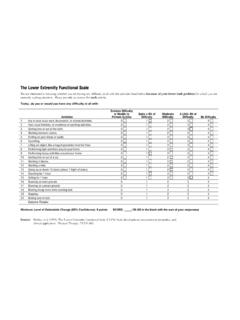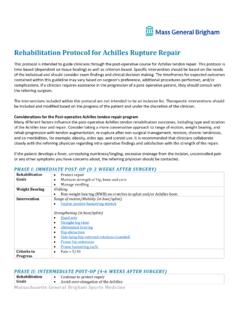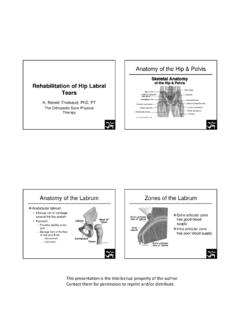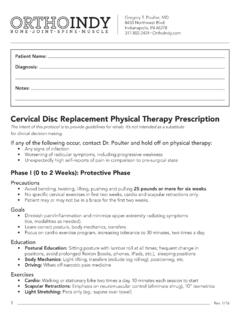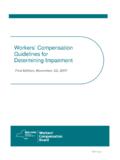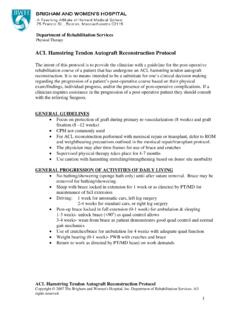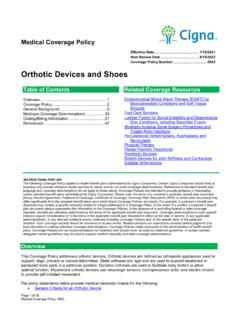Transcription of SECTION GG: FUNCTIONAL ABILITIES AND GOALS
1 CMS s RAI Version Manual CH 3: MDS Items [GG] October 2019 Page GG-1 SECTION GG: FUNCTIONAL ABILITIES AND GOALS Intent: This SECTION includes items about FUNCTIONAL ABILITIES and GOALS . It includes items focused on prior function, admission performance, discharge GOALS , and discharge performance. FUNCTIONAL status is assessed based on the need for assistance when performing self-care and mobility activities. GG0100. Prior Functioning: Everyday Activities Item Rationale Knowledge of the resident s functioning prior to the current illness, exacerbation, orinjury may inform treatment for Assessment 1. Ask the resident or his or her family about, or review the resident s medical recordsdescribing, the resident s prior functioning with everyday Instructions Code 3, Independent: if the resident completed the activities by himself or herself,with or without an assistive device, with no assistance from a helper.
2 Code 2, Needed Some Help: if the resident needed partial assistance from anotherperson to complete the activities. Code 1, Dependent: if the helper completed the activities for the resident, or theassistance of two or more helpers was required for the resident to complete the activities. Code 8, Unknown: if the resident s usual ability prior to the current illness,exacerbation, or injury is unknown. Code 9, Not Applicable: if the activities were not applicable to the resident prior tothe current illness, exacerbation, or s RAI Version Manual CH 3: MDS Items [GG] October 2019 Page GG-2 GG0100. Prior Functioning: Everyday Activities (cont.)
3 Coding Tips Record the resident s usual ability to perform self-care, indoor mobility (ambulation), stairs, and FUNCTIONAL cognition prior to the current illness, exacerbation, or injury. If no information about the resident s ability is available after attempts to interview the resident or his or her family and after reviewing the resident s medical record, code as 8, Unknown. Examples for Coding Prior Functioning: Everyday Activities 1. Self-Care: Ms. R was admitted to an acute care facility after sustaining a right hip fracture and subsequently admitted to the SNF for rehabilitation. Prior to the hip fracture, Ms. R was independent in eating, bathing, dressing, and using the toilet.
4 Ms. R used a raised toilet seat because of arthritis in both knee joints. Both she and her family indicated that there were no safety concerns when she performed these everyday activities in her home. Coding: GG0100A would be coded 3, Independent. Rationale: Prior to her hip fracture, the resident completed the self-care tasks of eating, bathing, dressing, and using the toilet safely without any assistance from a helper. The resident may use an assistive device, such as a raised toilet seat, and still be coded as independent. 2. Self-Care: Mr. T was admitted to an acute care facility after sustaining a stroke and subsequently admitted to the SNF for rehabilitation.
5 Prior to the stroke, Mr. T was independent in eating and using the toilet; however, Mr. T required assistance for bathing and putting on and taking off his shoes and socks. The assistance needed was due to severe arthritic lumbar pain upon bending, which limited his ability to access his feet. Coding: GG0100A would be coded 2, Needed Some Help. Rationale: Mr. T needed partial assistance from a helper to complete the activities of bathing and dressing. While Mr. T did not need help for all self-care activities, he did need some help. Code 2 is used to indicate that Mr. T needed some help for self-care. 3. Self-Care: Mr. R was diagnosed with a progressive neurologic condition five years ago.
6 He lives in a long-term nursing facility and was recently hospitalized for surgery and has now been admitted to the SNF for skilled services. According to Mr. R s wife, prior to the surgery, Mr. R required complete assistance with self-care activities, including eating, bathing, dressing, and using the toilet. Coding: GG0100A would be coded 1, Dependent. Rationale: Mr. R s wife has reported that Mr. R was completely dependent in self-care activities that included eating, bathing, dressing, and using the toilet. Code 1, Dependent, is appropriate based upon this information. CMS s RAI Version Manual CH 3: MDS Items [GG] October 2019 Page GG-3 GG0100.
7 Prior Functioning: Everyday Activities (cont.) 4. Self-Care: Mr. F was admitted with a diagnosis of stroke and a severe communication disorder and is unable to communicate with staff using alternative communication devices. Mr. F had been living alone prior to admission. The staff has not been successful in contacting either Mr. F s family or his friends. Mr. F s prior self-care ABILITIES are unknown. Coding: GG0100A would be coded 8, Unknown. Rationale: Attempts to seek information regarding Mr. F s prior functioning were made; however, no information was available. This item is coded 8, Unknown. 5. Indoor Mobility (Ambulation): Mr.
8 C was admitted to an acute care hospital after experiencing a stroke. Prior to admission, he used a cane to walk from room to room. In the morning, Mr. C s wife would provide steadying assistance to Mr. C when he walked from room to room because of joint stiffness and severe arthritis pain. Occasionally, Mr. C required steadying assistance during the day when walking from room to room. Coding: GG0100B would be coded 2, Needed Some Help. Rationale: The resident needed some assistance (steadying assistance) from his wife to complete the activity of walking in the home. 6. Indoor Mobility (Ambulation): Approximately three months ago, Mr.
9 K had a cardiac event that resulted in anoxia, and subsequently a swallowing disorder. Mr. K has been living at home with his wife and developed aspiration pneumonia. After this most recent hospitalization, he was admitted to the SNF for a diagnosis of aspiration pneumonia and severe deconditioning. Prior to the most recent acute care hospitalization, Mr. K needed some assistance when walking. Coding: GG0100B would be coded 2, Needed Some Help. Rationale: While the resident experienced a cardiac event three months ago, he recently had an exacerbation of a prior condition that required care in an acute care hospital and skilled nursing facility.
10 The resident s prior functioning is based on the time immediately before his most recent condition exacerbation that required acute care. 7. Indoor Mobility (Ambulation): Mrs. L had a stroke one year ago that resulted in her using a wheelchair to self-mobilize, as she was unable to walk. Mrs. L subsequently had a second stroke and was transferred from an acute care unit to the SNF for skilled services. Coding: GG0100B would be coded 9, Not Applicable. Rationale: The resident did not ambulate immediately prior to the current illness, injury, or exacerbation (the second stroke). CMS s RAI Version Manual CH 3: MDS Items [GG] October 2019 Page GG-4 GG0100.

